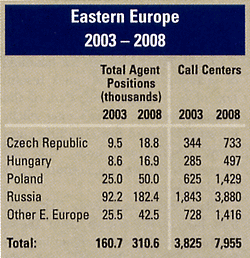| I |
talian business application software firm Finmatica,
looking to site its customer support services operation for the European
and Middle East markets, did what a number of international firms do when
they peruse Europe for potential sites. Finmatica chose a relatively compact
operation filled with highly skilled, multilingual agents offering value-added
services to clients around the clock. These are the types of customer support
centers currently in vogue in Western Europe. Finmatica ultimately chose
Dundalk, Ireland, for its new operation that will employ 60 by 2007.
But if a company needs more agents and labor
costs are more of a concern, Eastern Europe is the more likely project destination.

The number of call centers in Europe, the Middle
East and Africa (EMEA) will grow by 50 percent by 2008, increasing from
29,000 at the end of 2003 to 45,000, says a new report by London-based independent
market analyst Datamonitor (www.datamonitor.com). Employment in the sector
will swell to 2.1 million. The report finds that Eastern Europe, the Middle
East and Africa will see the biggest growth because the markets are less
mature. A contributing factor will be call center outsourcing from Western
Europe. Europe has evolved into a regionalized
market, says Cuno de Haas, senior consultant with BCI, a subsidiary of Buck
Consulting International (www.bciglobal.com) in Nijmegen, The Netherlands.
He says there are no real “hot spots” for call centers, just individual
project decisions.
Companies desiring small, high-end, value-added
support centers with 30-60 people are locating in Western Europe. Firms
needing larger operations of 200 agents or more are heading east, he says.
“Some variables can determine your search area,
such as facility size, languages required and the degree of qualification
of the agent,” de Haas says. “Where you are in that triangle will determine
where you look initially.” And because the services offered in the West
have evolved, he says the term “call center” is something of a misnomer.
“They are global technical centers or support
interaction centers or client assistant centers,” de Haas says. ” ‘Call
center’ is not the right label anymore when you look at the people inside,
the type of technology they are using and the activities being carried out.”
Higher levels of education are more of a factor
in the West, de Haas says. And companies increasingly require their agents
to be multi-dimensional.
“In some cases, customer support gets integrated
with other back-office services such as logistics and sometimes even manufacturing,”
de Haas says, citing the Volvo Action Center in Ghent, Belgium, as a model
operation.
Datamonitor says small center operations — those
having 10-30 agents — will comprise 55 percent of all facilities by 2008,
compared to the current 50 percent. Developments in Internet Protocol (IP)
technology will mean more call centers and fewer agents. The U.K. is the
largest and most mature European call center market with 5,980 facilities
and 435,000 agents, and Datamonitor reports that the U.K.’s fastest growing
segment will be in this smaller range.
Key in the East
De Haas says BCI starts in the capitals and major
cities when looking for locations in Eastern Europe, calling them “safe
bets” in terms of finding sufficient numbers of capable agents. Poland,
the Czech Republic and Hungary are regarded as the leading countries, he
says, adding that Slovakia and the Baltic States offer potential.

“Poland has a lot of large cities and you take
into account the large business centers with universities,” de Haas says.
“But the search would also in-clude remote locations along the border with
Russia.”
Huge, rapid investments by the Polish government
in a world-class telephony system have made the country an attractive option
for outsourcing, says Datamonitor, with investment poised to flow in from
Germanic language countries where companies are seeking to trim costs.
Hearing is believing in the East, de Haas says.
“If an American client wants to set up a site in Eastern Europe, [its decision-makers]
should go on a fact-finding trip to see if language skills will really be
an issue,” he says. “They must go to the locations to see how it sounds
to hear a Czech agent speak English or German. You cannot solve this by
looking at statistics.” 